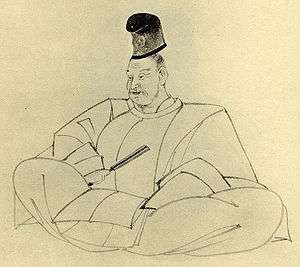Kada no Azumamaro

Kada no Azumamaro (荷田 春満, February 3, 1669 – August 8, 1736) was a poet and philologist of the early Edo period, who hailed from a scholarly family that for generations had supplied Shinto priests to the Inari shrine in Fushimi. From an early age he studied traditional Japanese poetry, waka, and Shinto thought and belief, and his precocity was such that he was soon employed as poetry tutor to one of the sons of Emperor Reigen (regnabat 1663–1687).
In 1699 he settled in Edo, where he taught the classics of Shinto, a curriculum which then included such ancient texts as the Man'yōshū and the Nihon Shoki. His studies in the former classic profited particularly from the work of the Buddhist priest Keichū, and together these two figures may be considered as founding fathers of the movement of nativist thought known as kokugaku ("national studies"). Kokugaku, together with the kogaku (古学: "Ancient Studies") school founded by Kamo no Mabuchi laid the foundations for both the renaissance of interest in Japanese classical poetry and culture, and for the nativist critique of Confucian ideology which was to prove of great ideological importance during and after the transformation of Tokugawa Japan into the modernizing nation of that country under Emperor Meiji .
See also
|